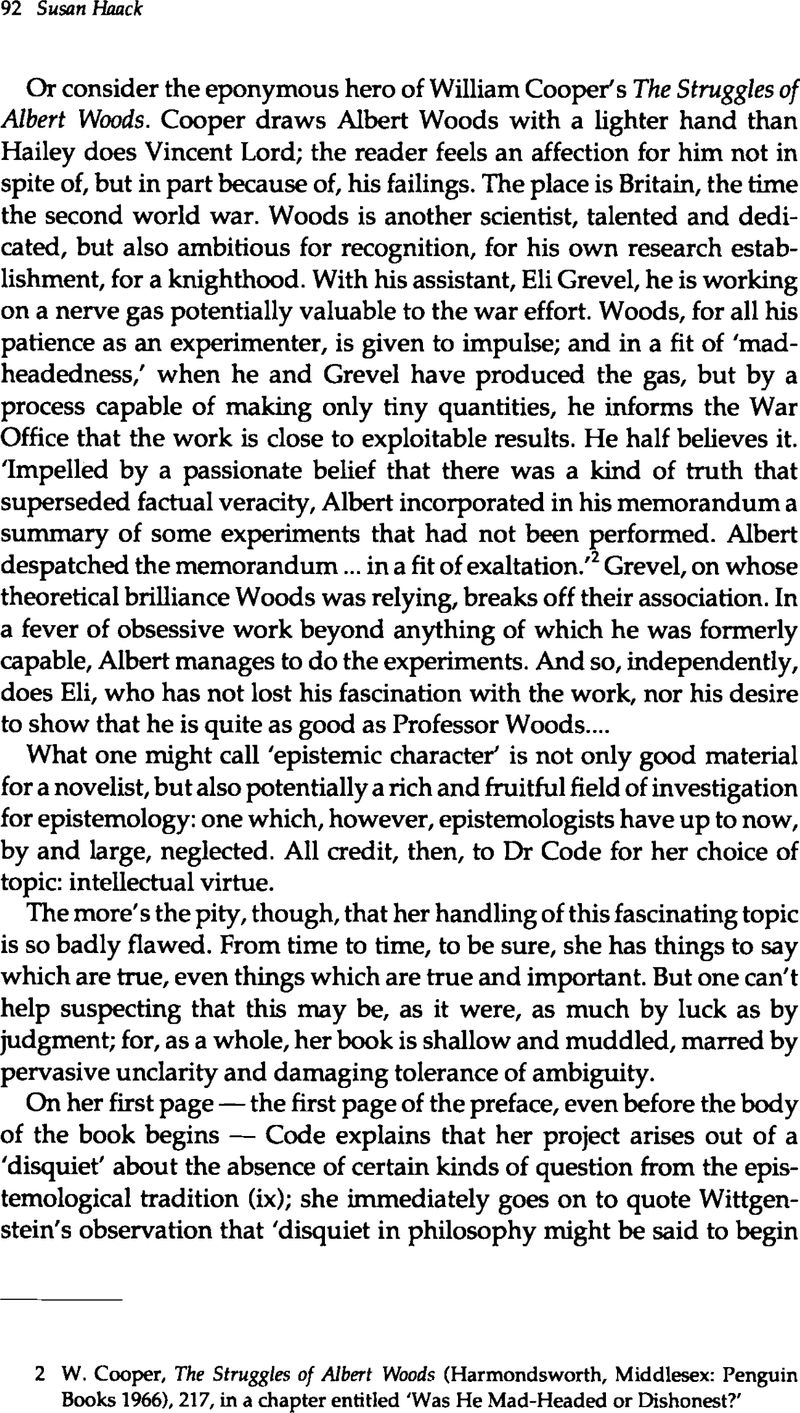Article contents
Douglas Walton Courage: A Philosophical Investigation. Berkeley: University of California Press 1986. Pp. xiv + 241. US$25.00.
Published online by Cambridge University Press: 01 January 2020
Abstract

- Type
- Critical Notice
- Information
- Copyright
- Copyright © The Authors 1991
References
2 Cooper, W. The Struggles of Albert Woods (Harmondsworth, Middlesex: Penguin Books 1966), 217Google Scholar, in a chapter entitled ‘Was He Mad-Headed or Dishonest?’
3 L. Wittgenstein, Zettel, G.E.M. Anscombe and G.H. Von Wright, eds. (Berkeley, CA: University of California Press 1970) section 447
4 It is worthy of note that Code nowhere asks whether foundationalism and coherentism are exclusive, nor whether they are exhaustive, alternatives. Cf. my ‘Theories of Knowledge: An Analytic Framework,’ Proceedings of the Aristotelian Society 83 (1982-3) 143-57, which proposes a third option, foundherentism.
5 See Sosa, E. ‘The Raft and the Pyramid: Coherence versus Foundations in the Theory of Knowledge,’ in Midwest Studies on Philosophy 5 (1980)CrossRefGoogle Scholar section 11; but note Sosa’s reliabilist inclinations. Cf. Monmarquet, J.A. ‘Epistemic Virtue,’ Mind 96 (1987) 482-97CrossRefGoogle Scholar, who also hopes to subordinate justification to virtue.
6 Cf. my ‘Rebuilding the Ship While Sailing on the Water,’ in Barrett, R. and Gibson, R. eds., Perspectives on Quine (Oxford: Black wells 1990), 111-27Google Scholar, where it is suggested that this distinction is important to an understanding of how the project of ratification of criteria of justification can avoid vicious circularity.
7 I should not disguise the fact that this is quite a radical conjecture, since, if true, it threatens the feasibility of the search for ‘the scientific method,’ at least as construed by not a few philosophers of science. They have, I suspect, failed to distinguish the two projects distinguished here.
8 ‘Error is … a mistake of our judgment … Those who cannot carry a train of consequences in their heads, nor weigh exactly the preponderance of contrary proofs and testimonies, may easily be misled to assent to positions which are not probable.’ Hailey’s Peat-Smith is an admirer of Locke, and this passage from the Essay Concerning Human Understanding plays a key role in the development of the plot (Strong Medicine, 255).
9 I have tried, I am not sure how successfully, to avoid suggesting that ‘accepting a belief’ is appropriately conceived as straightforwardly voluntary action on the subject’s part. Bonjour, Contrast L. The Structure of Empirical Knowledge (Cambridge, MA: Harvard University Press 1985) 8, 42, 151.Google Scholar
10 As I argued with specific reference to Popper in ‘Epistemology With a Knowing Subject,’ Review of Metaphysics 33 (1979) 309-35, and from the perspective of my foundherentist theory of justification in ‘Rebuilding the Ship,’ section I. Though Code refers to ‘Epistemology With a Knowing Subject’ (32, n. 21), I have the impression that she fails to appreciate that the concern of that paper was to argue rather that an adequate theory of justification must focus on the knowing subject than that the need to focus on the knowing subject shows that questions about epistemic character are more important than questions about justification.
11 Popper, K.R. ‘Epistemology Without a Knowing Subject,’ in Objective Knowledge (Oxford: Clarendon Press 1972) 106-52Google Scholar
12 The quotation is from Midgely, M. Beast and Man (Ithaca, NY: Cornell University Press 1978) 166.Google Scholar
13 Peirce, C.S. Collected Papers, Hartshorne, C. Weiss, P. and Burks, A. eds. (Cambridge, MA: Harvard University Press 1931-58)Google Scholar 5.265
14 Annis, D. ‘A Contextualist Theory of Epistemic Justification,’ American Philosophical Quarterly 15 (1978) 213-19Google Scholar. Popper, in Objective Knowledge likens scientific knowledge to a medieval cathedral, built by generation after generation (121).
15 She is quoting Quinton, A. Thoughts and Thinkers (London: Duckworth 1982) 67.Google Scholar
16 MacIntyre, A. After Virtue (London: Duckworth 1981) 178, 175Google Scholar
17 I hope I may be excused from the obligation to inquire whether the books from which my examples are taken count as literature or only as fiction, for nothing in Code’s discussion seems to tum on the distinction. If the point is felt to be important, perhaps I may allude to Butler’s, Samuel The Way of All Flesh (New York: Signet 1960 [1903])Google Scholar, as a work of literature offering an extraordinarily shrewd portrayal of the epistemic vice of self-deception.
18 In this context it would have been desirable for Code to have shown some appreciation of the possibility of distinguishing what is false and what is not true.
19 Of course, fiction may also be a good source of potentially explanatory hypotheses about other matters besides human character. Cf. my allusion to Doris Lessing’s The Four-Gated City in ‘Rebuilding the Ship,’ section II.
20 A point I develop in ‘Surprising Noises: Rorty and Hesse on Metaphor,’ Proceedings of the Aristotelian Society 87 (1987-8) 179-87.
21 I allude, of course, to Peirce’s slogan, ‘Do not block the way of inquiry,’ Collected Papers, 1. 135. This seems particularly appropriate in view of the fact that Code not only expresses sympathy with pragmatism (27, n.ll), but even seems to congratulate Peirce on having anticipated a central strand of her position (50).
22 I wish to thank A. Phillips-Griffiths for comments on a draft, M.M. Warner for discussion of Macintyre, and L. Floridi for a conversation which prompted me to try out the conjecture about the relation between questions of justification and questions of epistemic character suggested above.
- 1
- Cited by


